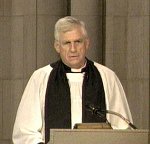
According to Senator Danforth, it is time for politics to be unifying. Huh? What is democracy, if not the hashing out of different points-of-view? Why should a certain group of people have to check their most deeply held convictions at the entrance to the Public Square? To be fair, it does not seem to me that Danforth wants to ban faith from the Public Square entirely, he just wants to eliminate those whose faith leads them to different conclusions than those to which his faith leads him. Now, that's democracy!

As humor often does, John Stewart arrived, albeit inadvertently, via a humorous question, at a deep insight. Of course, the question was ignored because it was a joke. The question Stewart asked Danforth was, given the views he expresses in his book, "as a U.S. Senator and an Episcopal minister, did you believe in seperation of you from you?" I would be interested in Danforth's response to this question.
Now, lest this post be written off as right-wing rant, in addition to not being a right-winger, let me state three things:
1) The Republican Party has cynically manipulated voters, especially during the Bush presidency. For this they paid the price on 7 November. My point? Democracy works.
2) "Democracy demands," Senator Obama said in speech this past Spring, "that the religiously motivated translate their concerns into universal, rather than religion-specific, values. It requires that their proposals be subject to argument and amenable to reason. I may be opposed to abortion for religious reasons, but if I seek to pass a law banning the practice, I cannot simply point to the teachings of my church or evoke God's will. I have to explain why abortion violates some principle that is accessible to people of all faiths, including those with no faith at all." I would add that even if people of faith fail to translate their concerns into universal values, they are free to bring them to bear when they vote, or when they hold public office. And, if, as public office-holders, their positions represent their constituencies, they can continue to serve.
3) It is also necessary, as Pope Benedict XVI recently observed, for the Church, in her proclamation, to link the two poles, to bridge the gap, between so-called liberal values of peace, care for the environment, and social justice with so-called conservative values of protecting life from conception to natural death, the place and meaning of sexuality, and defense of the family. None of these values are mutually exclusive.
I, for one, do not seperate me from me when voting or advocating. Or, to put it in language fit for congregational proclamation: I believe in personal integration, not compartmentalization.


Dear Scott,
ReplyDeleteI read your blog regularly and I usually end up forwarding them to my friends. Here is a question for you that relates to what we were talking about last Thursday during RCIA as well as this blog. My question is this, If Pope Benedict were an American would he be a republican or democrat? To me I vote a for a democrat because I believe they are the most socially and environmentally responsible party. Even if I don't necessarily feel other issues such as abortion are right I felt that that was a more personal decision that shouldn't be governed by others. If one thing that makes us 'human' or 'american' is our freewill then taking away the choice doesn't seem quite right. Either that or you can look at it like the lesser of the two evils. I know the Republicans get a decent amount of votes because they are pro life and play the morality card but they seem to fall short in so many other areas such as education, healthcare, etc. So after the class last week I was wondering... which one is truly the lesser of two evils.
Dear Lisan:
ReplyDeleteAs usual you ask some very good questions and show great sense of how to approach the answer. As an European Pope Benedict, prior to becoming Pope, had a lot of positive things to say about Social Democrats. This surprised a lot of people. As Catholics it is a matter of best bridging the gap between so-called liberal values- the environment, peace, social and economic justice and conservative values- protection of life, the family, and sexuality. It is safe to say that neither party in the U.S. is a Catholic party. I don't think if Pope Benedict were a U.S. Bishop he'd be partial to either. After all, Christianity is not an ideology and becomes confused and distorted when Christians try to make it one- this has been stated over-and-over by the Holy Father.
As I stated last Thursday, while, as Catholics, we agree about the ends we are trying to achieve, we may legitimately differ about the means by which we seek realize the ends. However, we may never support immoral means to bring about moral ends because ends don't justify the means. You are correct in that how you vote is up to you. You are the one who decides who to vote for and why. Therefore, it is you who decides how to bring the values we derive from our common faith to bear on your decision. The Church does not do that for you, or even try. The Church wants to you be mature, moral person. Our bishops teach us that we have a moral obligation to vote. When voting we all have to make prudential judgments. It is rare not to have to decide what is most important, especially given that there are no ideal candidates.